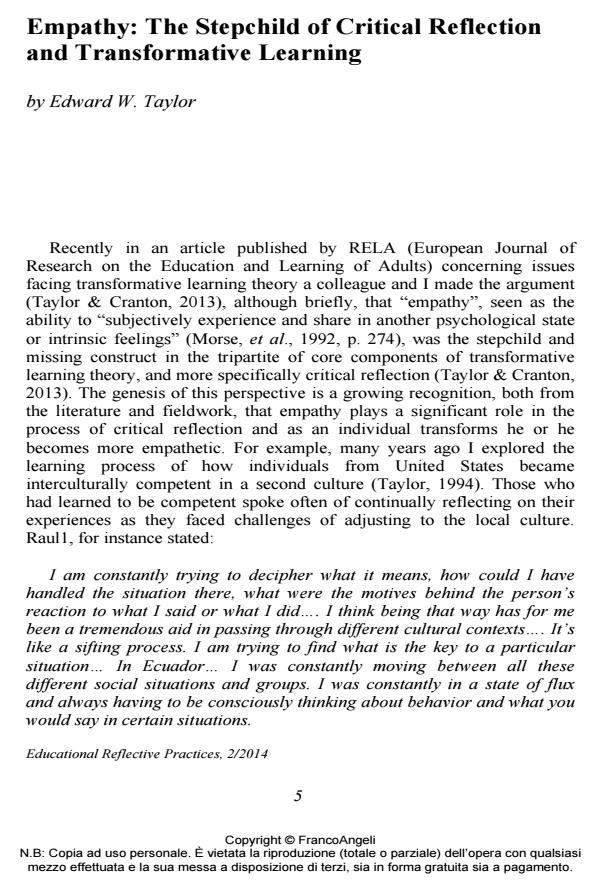Empathy: The Stepchild of Critical Reflection and Transformative Learning
Journal title EDUCATIONAL REFLECTIVE PRACTICES
Author/s Edward W. Taylor
Publishing Year 2015 Issue 2014/2
Language English Pages 18 P. 5-22 File size 107 KB
DOI 10.3280/ERP2014-002001
DOI is like a bar code for intellectual property: to have more infomation
click here
Below, you can see the article first page
If you want to buy this article in PDF format, you can do it, following the instructions to buy download credits

FrancoAngeli is member of Publishers International Linking Association, Inc (PILA), a not-for-profit association which run the CrossRef service enabling links to and from online scholarly content.
Historically, three constructs have been seen as central to transformative learning theory, critical reflection, dialogue, and experience (Mezirow, 1990). Learners’ experience, is seen as socially constructed, as constituting the starting point for dialogue, as the essential medium through which a transformation is promoted and developed, and as leading to critical reflection where learners question ‘the integrity of deeply held assumptions and beliefs based on prior experience (Taylor, 2009, p. 7)’. Missing in this tripartite of core components of transformative learning theory is ‘empathy’ which typically is seen as the ability to ‘subjectively experience and share in another psychological state or intrinsic feelings (Morse, et. al, 1992, p. 274)’. As a construct, empathy has been mentioned in the literature as significant to reflection specifically and generally transformative, although it is rarely defined or discussed in much depth, particularly in its relationship to the central constructs of transformative learning. Questions are raised: What is empathy and what is the role of empathy in relationship to reflection? To critical reflection? And transformative learning? Recognizing the significance of empathy what are the implications for fostering reflection? This manuscript would address these questions and review recent research on empathy, reflection and TL.
- Keep the bedtime story: A daily reading ritual improves empathy and creativity in children Maeve Winter, A. J. Willy, James Ingersoll, Michael Joseph Meyer, Erin B. D. Clabough, Laura Hannah Kelly, in PLOS One /2026 pp.e0340068
DOI: 10.1371/journal.pone.0340068 - Theory and Practice for Understanding Process and Outcomes of Transformative Learning Claudio Melacarne, Alessandra Romano, in EDUCATIONAL REFLECTIVE PRACTICES 2/2019 pp.214
DOI: 10.3280/ERP2018-002014 - Coming to Appreciate Diversity: Ontological Change Through Student–Student Relationships Brian Kelleher Sohn, in Journal of Transformative Education /2021 pp.50
DOI: 10.1177/1541344620940811
Edward W. Taylor, Empathy: The Stepchild of Critical Reflection and Transformative Learning in "EDUCATIONAL REFLECTIVE PRACTICES" 2/2014, pp 5-22, DOI: 10.3280/ERP2014-002001